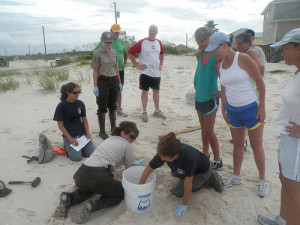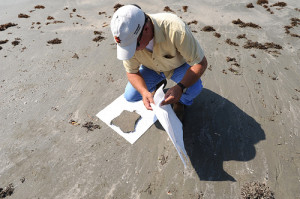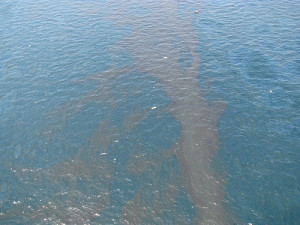
BON SECOUR NATIONAL WILDLIFE REFUGE , Ala. - Relocation procedures for sea turtle that are too close to the tideline. (Photo Credit: U.S. Fish and Wildlife Service photo by Bonnie Strawser)
By Serena Norr and Joann Pan
As we discussed in the first part of this series “The Devastating Impact of the BP Oil Spill on Real Estate,” the oil spill off of the Gulf Coast has not only affected our waters, marshes, animals and our health, but the “worst spill in history” has also greatly impacted the real estate industry. Although we are happy to hear that engineers have been able to stop oil gushing from the well [LA Times Blog], there is the looming question pertaining to the state of real estate in Alabama and Mississippi. Early numbers are estimating that the oil spill will “drive down the Gulf’s property values by 10 percent for at least three years,” according to CoStar Group Inc [Bloomberg]. The International Property Estimate stated that “losses may total $4.3 billion along the 600-mile (966- kilometer) stretch from the Louisiana bayous to Clearwater, Florida.”
Since April 20th, new property developments in Alabama and Mississippi have been put “on hold” and commercial properties such as hotels that are suffering from a decline in tourism and the inability to provide certain supplies such as with restaurants that can no longer offer fresh and local shrimp, oysters, etc. Some of these real estate issues are not immediate, but will impact these areas long after the spill has been cleaned. Will people want to relocate to an area that was once covered in oil — whether directly or nearby? Will the water ever be clean enough for fishing? Will tourism pick up? As the pieces are starting to be picked up and clean-up efforts are prevalent in the Gulf, we will be keeping a watch eye, hopeful that we will be able to report on positive news from the Gulf.

GALVESTON, Tx - Cleaning up tar balls off on Galveston beaches. (Photo Credit: U.S. Coast Guard photo by Petty Officer 2nd Class Prentice Danner)
Alabama’s Businesses Suffer Including Restaurants, Condo Owners, Shops Owners and Fishing Industries
For three months, after the media has continually projected the dismal prospect of coastal communities affected by the BP Oil Spill to the rest of the world, the states lining the Gulf of Mexico are seeing and feeling the onset of low numbers of tourists and homebuyers. When President Obama went to see the effects of the BP oil spill on the state in mid-June, Governor Bob Riley and the communities of Alabama were relieved to have president see the effects for himself. In a speech, the president addressed the jabs that the tourism and fishing industries have suffered. The lives of Alabama’s shop owners, restaurateurs, commercial and sport fishermen and those in real estate have not seen normal business for about three months [Montgomery Advertiser]. As oil continues to wash to shore, it’s not the effects on the beaches that worries community members, but the state’s precious marshes, estuaries and wetlands that will be lost. Tourism is also down, which is evident by the pictures of empty beaches that would normally be flooded with people. There are men bringing booms down to the waters—approximately 10,000 feet of booms a day to keep the oil at bay.
As soon as the oil started leaking—rather gushing relentlessly into the Gulf of Mexico—officials and professionals have been implemented quick clean-up of the space. As personnel continue to tread the waters of the Gulf, people are coming forward with disaster-related illnesses. In Louisiana, their Department of Health is aware of 71 cases and in Alabama, there are 15 reported illnesses—a mix of respiratory problems and skin irritations [CNN Health]. As soon as news like this hits to mainstream, areas where tourism and properties are hot start to see businesses fade.
The NY Times painted a dreary picture for us on July 5 by running a feature about an Alabaman seaside Inn that has seen the scary effects of the oil spill that include a lack of bumper-to-bumper traffic along Perdido Beach, minimal diners at coastal restaurants, missing swimmers in the water and a diminished population of seagulls riding up the coast. And in the place of those summer beach expectations are tar balls and lines of oil that have layered themselves in the daily repetitions of low tide and high tide that brings new sand and oil on shore. The building’s owner is Jerry Gilbreath, 61, who bought the structure in 1980 and turned it into a successful bed-and-breakfast. Now, Gilbreath, like other resort, hotel and property owners in Alabama are struggling to meet ends meet. To give you an idea the inn made $21,000 last June, but only made $6,000 this June, a month after the drum of oil starting leaking [the NY Times].

NEW ORLEANS - Debris and oil in the Gulf of Mexico from the Deepwater Horizon drilling.
Mississippi’s Job Loss, Real Estate Outlook and Tourism Industry
Since the oil spill, 4,500 unemployed workers in Alabama, Louisiana, Florida and Mississippi have been hired to clean the beaches– raking and shoveling debris, taking out trash and using power loaders to wash away oil-covered rocks [CNN Money]. Although finding work is always a positive sign (especially since Mississippi has an 11.5 percent unemployment rate), the conditions in which these workers were hired is not something residents of these Gulf States were expecting.
The immediate impact of the spill is not the only matter at hand, but one that Mississippi will be dealing with years after the spill; especially when pertaining to real estate. Recently, several real estate agents and brokers have requested $20 billion dollars as compensation for the loss of sales due to the oil spill. Kenneth Feinberg, a Washington attorney who is working on organizing money for the victims, stated “The Realtors and real estate brokers are a major political force. I’m hearing from them constantly. I’m not sure whether they have a valid legal claim.” As of now, these claims fall into the category of “tough eligibility decisions,” whose issue will be further explored through an independent committee held next month [SunHearald.com].
There is also the issue of the loss of jobs and tourism in Mississippi. A University of Mississippi study found that the oil spill could cost Jackson, Harrison and Hancock counties nearly $120 million in the tourism and service sectors; while the Mississippi Development Authority estimated that tourism was down statewide and about “seven percent in fiscal 2010 to $5.2 billion” [Insurance Journal]. Hit the hardest right now are non-casino hotels, which are down by $50 million and services related to tourism such as restaurants, beverages and food and area beaches (even though no oil has been washed onto Mississippi’s beaches). According to David Bulter, a professor who conducted the survey, these figures are related to the “negative images portrayed by the national news.” There has also been a decline in charter boats and recreational and commercial fishing.
Now that the leaking has been stopped by a temporary cap—until further measures can be made, that is—we wait and hope for positive news in the upcoming months.
Sources and Additional Reading:
All photos are from Deepwater Horizon’s flickr page- http://www.flickr.com/photos/deepwaterhorizonresponse/
This entry was posted
on Monday, August 2nd, 2010 at 7:35 am and is filed under foreclosures, homes for sale, Insurance, Mortgages, Moving, Real Estate, Relocation, rentals.
You can follow any responses to this entry through the RSS 2.0 feed.
You can leave a response, or trackback from your own site.
Leave a Reply
drum shop…
[…]Part II: The Devasting Impact of the BP Oil Spill on the Real Estate Industry | Relocation.com[…]…